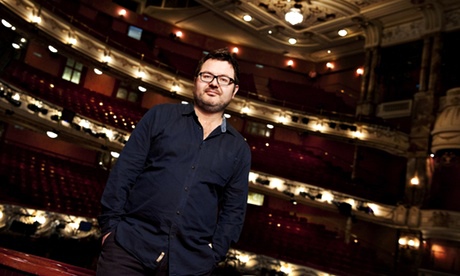“My agent nearly had a heart attack when he came to see the show,” says Christian Curnyn, with a chuckle and a mischievous twinkle in his eye. The conductor is talking about a now notorious production of Rameau’s opera Platée in Stuttgart in 2012. When the show started, Curnyn was on stage – asleep in a bed, having various sex acts performed on him by one of the leads.
This was not, however, what alarmed his agent. He had taken fright moments before, when he saw that the assistant conductor, not Curnyn, was at the helm of the orchestra. “He thought I must have pulled out,” says Curnyn, conductor, harpsichordist, baroque specialist, and one of the most adventurous and opinionated musicians working in opera today. “But then the orchestra started playing and woke me up. I moved through the audience, kicked in the door to the orchestra pit, chucked the assistant out, and got on with the show.”
Curnyn, 42, clearly loved being at the centre of the action in this gutsy smorgasbord of cross-dressing, love and lust, staged by the riotously imaginative Spanish director Calixto Bieito. And Curnyn’s interventions didn’t stop at simulated sex: it was his idea that during one of the opera’s most dazzling arias – sung by a soprano brandishing an electric guitar – a woman in the audience, actually a member of the cast, should jump up and shout: “That bitch fucked my husband!”
Such behaviour is unusual in conductors. Somehow, I can’t see Antonio Pappano ever being quite so up for it. Glasgow-born Curnyn’s love of avant-garde productions started when he was a teenager, travelling to the Edinburgh festival to see the Wooster Group and Pina Bausch. It’s a grounding that has made him a natural collaborator with English National Opera (ENO), known for its risk-taking and experimentation.
We meet during rehearsals for the sixth show he has conducted at ENO in five years, a new production of Handel’s Rodelinda, directed by Richard Jones. “Every day’s a masterclass with Richard,” Curnyn says. But all of the ENO shows he’s been involved with have pushed the envelope of baroque opera, from Christopher Alden’s Partenope in 2008 to Michael Keegan-Dolan’s recent Julius Caesar. Both proved controversial with critics, as did Barrie Kosky’s Castor and Pollux, with its nudity, flagrant eroticism and – most shockingly for the delicate sensibilities of some opera fans – the disembodied hand that emerged from a mound of earth to masturbate singer Laura Tatulescu during one of her arias as Phoebe.
Curnyn, who describes that 2011 production as an “absolute masterpiece”, is still furious with critics for their “lazy journalism” in obsessing over the set, which was a large box seemingly made of MDF. “One of the things they all wrote was that Barrie staged the piece in an Ikea box. I mean, come on, can’t you think of anything more interesting to say?” The Guardian’s Tim Ashley definitely could, although his problem was the “whiff of misogyny in it all, with the male body displayed and admired throughout, while the female body is continuously distorted”.
But there’s no getting a word in. Curnyn is on a roll. “Or the movement and choreography in Julius Caesar,” he says, “which they compared to Pina Bausch. Actually, it had nothing to do with Pina Bausch, but she’s the only contemporary choreographer they’ve ever heard of.” He pauses, but only to tell me to make sure this goes on the record: “I literally had people coming up to me after both productions saying: ‘God, I’m so sorry you had to conduct that show.’ Well, I’m not! It’s a great privilege to work with people like Barrie, Michael or Richard.”
One other thing these reviews shared was thunderous praise for the music. That must have given Curnyn some pleasure? “Not really. People think it’s a compliment to say that the singing was good, or the playing was good, even if they hated the production. But it’s really not. I’d much rather the music and the staging weren’t separated. They’re both integral to the show.”
This is more than just another anti-critic tirade, though. Curnyn’s passionate defence of these shows and their directors comes from his fundamental views about how baroque opera can be relevant to today’s world. Not just relevant actually – intoxicating too. And if that means the conductor occasionally has to take his clothes off and hop into a bed, then so be it. “The thing is,” he says, “the opera world has to be challenged. Things have to change.”
The mission statement of the Early Opera Company (EOC), which Curnyn founded in 1994 fresh out of university, promised that its productions would only be done in modern dress. “I’ve grown a bit more lenient in my old age,” he says, “but this is what it’s about: if you want to be true to the power of these pieces, you’ve got to understand the sensation they created when they were new. And in Rameau or Handel’s time, what audiences were seeing on stage were versions of themselves. They weren’t looking at people prancing around in pastoral costumes – they were looking at people in their own clothes. It wasn’t anything to do with looking to the past. It was totally new. That’s so important. Audiences today should look at the characters on stage and think: ‘That could be me’, ‘That’s us’ – rather than looking through some gauze of pseudo-restoration.”
He wants the music to have a similar impact. When he works with his own players in the EOC – as he will in March with a groundbreaking, intimate production of Cavalli’s L’Ormindo at the new Sam Wanamaker Playhouse at the Globe – Curnyn can rely on their intimate knowledge of 18th-century style, manners and instruments. But that’s not true when he’s conducting the ENO, with its modern instruments and new-fangled ways of thinking.
Or Scottish Opera. In 2005, their production of Handel’s Semele proved a baptism of fire. Curnyn set out to teach a modern orchestra how to perform with the inflection, articulation and subtlety he wanted. “I hadn’t a fucking clue what I was doing with the orchestra, to be honest,” he laughs. “But you learn on the job and I’m very grateful that, in the end, they did trust me. But orchestras do test you out – you have to be firm.”
As for ENO, he’s astonished by their endless ability to assimilate his ideas, and inhabit a world of unfamiliar tunings, different speeds, phrasings and ornamentation – so every performance feels new and alive. “When we did Julius Caesar, it was different every night. And it has to be.” That’s one reason why Curnyn’s ENO performances are so special: you feel they’re being invented right in front of you.
It’s time for him to go back to Rodelinda. But before he goes, he quickly returns to a favourite theme: the need for avant-garde opera directors to be supported. “I don’t understand those conductors who just look at the musicians and don’t engage with what’s happening on stage. I mean, if you don’t like all that, if you don’t like modern theatre, then why do opera?”
• Christian Curnyn conducts Handel’s Rodelinda at English National Opera, London, 28 February to 15 March; and Cavalli’s L’Ormindo at the Sam Wanamaker Playhouse, London, from 25 March to 12 April.










